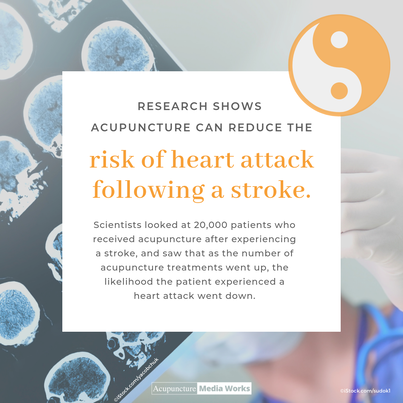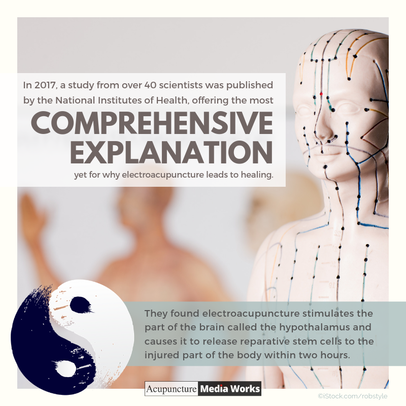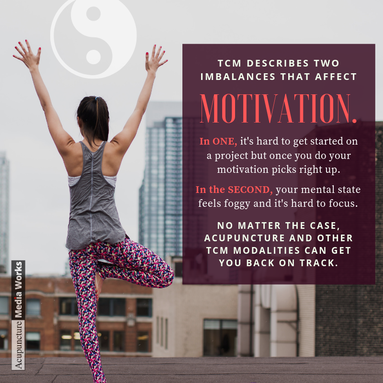 A study published by the National Institutes of Health looked at the prevalence of acute myocardial infarction, or heart attacks, on participants that received acupuncture treatments compared with those who did not. The group of participants that were selected to receive acupuncture went through at least one acupuncture treatment course (six sessions). The results showed those receiving the acupuncture treatment series were less likely to experience a heart attack. And the more treatment sessions, the less likely a heart attack would occur. This study shows regular acupuncture treatments can indeed be helpful at preventing heart attacks. Traditional Chinese Medicine (TCM), just like Western medicine, believes the heart is responsible for the circulation of blood. When the heart is strong, circulation will be sufficient, the body will be well nourished and the pulse will reflect that by being full and regular. Both medical systems agree a weak heart can manifest as palpitations, chest pain and even heart disease or a heart attack. Where the two medical systems diverge is this: Traditional Chinese Medicine also acknowledges that the heart “houses the mind.” In TCM, the heart and the mind are virtually inseparable. The heart governs the ability to think clearly, sleep soundly and maintain a good memory. Our emotional state is strongly influenced by how healthy or unhealthy our heart may be. A weak and deficient heart may create feelings of anxiety and mania, while also contributing to insomnia, forgetfulness and lack of concentration. Conversely, a weak mind or uncontrolled emotions can lead to a sick heart. Regular acupuncture treatments have been found to be very helpful in lowering blood pressure. The needles stimulate the release of opioids, which then decrease the heart’s activity and its need for oxygen. This in turn helps lower blood pressure. Acupuncture also decreases the resting heart rate and blood pressure by helping to decrease stress levels. Unmanaged, chronic stress can lead to heart disease, high blood pressure, heart arrhythmias and even heart attacks. Numerous studies have shown that stress can be managed through the use of acupuncture. TCM offers more than just acupuncture to treat stress, though. Herbal formulas and exercises like tai chi and qi gong are all wonderful tools for managing stress and keeping the heart healthy. Poor sleep and insomnia have been linked to heart failure, heart attacks, high blood pressure and strokes too. TCM can help treat a wide array of sleep problems without the harsh side effects of many pharmaceuticals. When a person is rested, their heart will generally be healthier. Without a healthy heart, the body cannot function properly and the mind may be clouded and disconnected. Contact a licensed acupuncturist in your area to see how TCM can assist you with all of your heart health needs. https://www.ncbi.nlm.nih.gov/pmc/articles/PMC5381414/ Add: https://www.healthcmi.com/Acupuncture-Continuing-Education-News/1886-acupuncture-prevents-heart-damage-confirmed?fbclid=IwAR2n8K4PA7pIQIM_eUPEwCYgxFEHb-HztbXIwcw6mzNYRnZGE7DCpJUzo20 ?  A 2017 study from researchers at the Indiana University School of Medicine helps to show how electroacupuncture can stimulate tissue repair after an injury and relieve pain through a specific neurological mechanism. Over 40 scientists at research institutions in the United States and South Korea collaborated on the study. Through a series of tests, first on horses and then humans, the final study offers the most comprehensive view yet of how electroacupuncture stimulates the release of stem cells, special cells that develop into a variety of kinds of cells and repair cells. The first uses of electroacupuncture are attributed to a Chinese doctor, Tang She-cheng, in 1934. In the West, the term is attributed to Dr. Roger la Fuye of France in 1947. Electroacupuncture uses the same principles as acupuncture, which involves inserting fine, sterile needles at specific points on the body. In electroacupuncture, however, practitioners add a small electrical current to the inserted needles, rather than simply stimulating the points by tapping or gently twisting the needles as they’re inserted. Through brain MRIs, this research showed electroacupuncture activates the hypothalamus – a part of the brain responsible for controlling the nervous system and subconscious functions like the heart rate. Electrical stimuli from the needles reached the brain of the subjects within nine to 22 minutes, depending on the species. From there, reparative stem cells, called mesenchymal stem cells, were released into the bloodstream within two hours. These cells can differentiate into bone, cartilage and muscle cells, among others, aiding in repairing injured areas of the body. In order to access this response, researchers administered the electroacupuncture at specific acupoints related to the immune system. The study found increases in a type of collagen that promotes tendon repair, which contributes to research looking to better understand stem cells. The collagen also produces anti-inflammatory cells known to be predictors of faster healing time. https://www.sciencedaily.com/releases/2017/03/170316174225.htm https://medicine.iu.edu/news/2017/03/u-researchers-find-electroacupuncture-releases-stem-cells/  From an acupuncture perspective, your body is made up of lots of different kinds of Qi, or energy. These different types of Qi have specific physiological functions in the body. One essential type of Qi is the Wei Qi. Roughly translated as “immunity,” the Wei Qi is your body’s natural strength and ability to fight off pathogens like viruses and bacteria. The Wei Qi, also called “protective Qi” flows in the space between the skin and muscles, and is the first line of defense against sickness (after your skin). The Wei Qi also controls the opening and closing of the pores, so spontaneous sweating is a sign of a weakness in your protective Qi. When the Wei Qi is not strong enough, we are not able to fight off outside pathogens, and we get sick. A number of other energetic imbalances can weaken our Wei Qi:
So, how do you make sure your Wei Qi is healthy and strong?
 We’ve all been there - you have the best of intentions to do something positive or productive (go to the gym, make healthy dietary changes, start working on a new project around the house, finish a work assignment, study for an upcoming test) - but you end up spending hours procrastinating, making excuses to yourself and not doing the thing you need to get done. Why is it so hard to get motivated sometimes? From a Traditional Chinese Medicine perspective, lack of motivation may stem from multiple different types of energetic imbalances in the body - and how to overcome that lack of motivation depends on what type of imbalance is holding you back. You are stuck. In TCM theory, the liver energy system is in charge of the “smooth flow” of Qi, or energy, throughout the whole body. When liver Qi flows smoothly, we are physically and mentally healthy, vibrant and on top of our game. But when liver Qi gets stuck, a whole lot of problems can ensue, such as neck and shoulder tension, headaches, irritability, impatience and lack of motivation. This type of lack of motivation is the kind where it is hard to get something started...but once you start, you feel so much better and have no problem continuing. A perfect example is wanting to exercise, but having a really hard time motivating yourself to get out the door because you feel tired and angsty. However, if you overcome that feeling and push yourself to exercise, you will notice your problem with motivation decreases drastically, and you’ll feel like a different person when you come back home. This is because the original problem was that your Qi was stuck - and exercise got it going again. The liver energy is also related to our ability to plan, create a vision for the future and set goals. When the liver energy is stuck, it is harder for us to see how our daily tasks relate to the future we want for ourselves. Physical movement helps motivation problems connected to Qi stagnation. Push yourself in your workouts to clear your head and overcome the stagnation, or take a break at work and go for a walk to regain your motivation and focus. You are damp. Dampness is a concept somewhat unique to TCM. It refers to an abnormal processing of fluids in the body. These fluids coalesce in various places – for instance, when dampness accumulates in the joints, there may be joint pain that is worse in rainy weather. When dampness accumulates in the mind, it can lead to a lack of motivation. This type of problem with motivation is associated with a lack of mental clarity, foggy-headedness, a general feeling of sluggishness and an inability to keep focused on any given task. Dampness is slow and cloudy, and creates a haze over our mental functioning. This extends into our ability to start tasks, as well. To overcome a lack of motivation associated with dampness, it is important to look at environmental factors that may be making you damp. Are you living in a damp house? Are there things you can do to clean up that aspect of your living area? For instance, consider using a dehumidifier if you live in a basement apartment, or adding houseplants and natural sources of light to your space. It is also very important to look at your diet. If you are struggling with dampness, avoid dairy, sugar, and fatty or greasy foods. Also eat warm, cooked foods as much as possible, and limit your intake of raw or cold foods, which tax the digestive system and can lead to dampness. |
AuthorsRebecca M H Kitzerow is a Licensed Acupuncturist practicing in La Center, Washington. With over a decade of experience she has won 10 Nattie consumer choice awards from Natural Awakenings Magazine since 2014. Archives
July 2024
Categories
All
|
Photos from Hey Paul Studios, BeGreen_Studio, Pawel Pacholec, 1950sUnlimited, toulupaliaqaz, Joelk75, OnTask, Robert Gourley, cnu_sports, Mitya Ku, wuestenigel (CC BY 2.0), FootMassagez, 401(K) 2013, Mariana Heinz, @EdwardTerry, fishhawk, liverpoolhls, torbakhopper, Boemski, dolomitibl, Driscolltheque, Dave n Laura, Vaping360, MVWorks, Life Mental Health, MVWorks, mikefats, Scot Nelson, jfl1066, wZa HK, ruurmo, Guadalupe Cervilla, Army Medicine, GViciano, torbakhopper, adrigu, Saulo Cruz, Ben Cumming, marniejoyce, kcxd, JasonCorey, kanenas.net, Live to Create Photography, gm.esthermax, Unique Hotels Group, Zenspa1, mysiana, Tobias Lindman, Leader Nancy Pelosi, Kristoffer Trolle, swanksalot, Bill Selak, Parker Knight, stimpsonjake, Gedankensprudler, SuperFantastic, tonynetone, marniejoyce, JeepersMedia, Illusive Photography, 'Ajnagraphy', Iban Torras, scotted400, gtall1, dvanzuijlekom, BPPrice, Skley, torbakhopper, Renato Ganoza, anka.albrecht, QUOI Media, Public Domain Photos, Instant Vantage, Victor Tongdee, Free Grunge Textures - www.freestock.ca, sportEX journals, Nadja Tatar, angela n., marniejoyce, MVWorks, Karolina Kabat, Thomas Fisher Rare Book Library, UofT, ginnerobot, tracilawson, haven't the slightest, My Photo Journeys, Pierre Willemin, Florena_Presse, SuperFantastic, colindunn, zzkt, TraumaAndDissociation, ER24 EMS (Pty) Ltd., shixart1985 (CC BY 2.0), marniejoyce, Tomás Fano, freestock.ca ♡ dare to share beauty, Archives New Zealand, Jaykhuang, airdrie.m, Go-tea 郭天, OnTask, wuestenigel, focusonmore.com, Disney | ABC Television Group, Andrew Gustar, Didriks, ConstructionDealMkting, charlywkarl, barnimages.com, Lel4nd, runwaypilates, michaelstephanfotografie, McLevn, TraumaAndDissociation, eLife - the journal, Lars Plougmann, wuestenigel, shixart1985, boviate, davis.steve32, kevin dooley, @the.photoguy (insta), frederic.gombert, Feathering the Nest, Victor Tondee, shixart1985, wuestenigel, Joe K Gage, kennethkonica
 RSS Feed
RSS Feed
